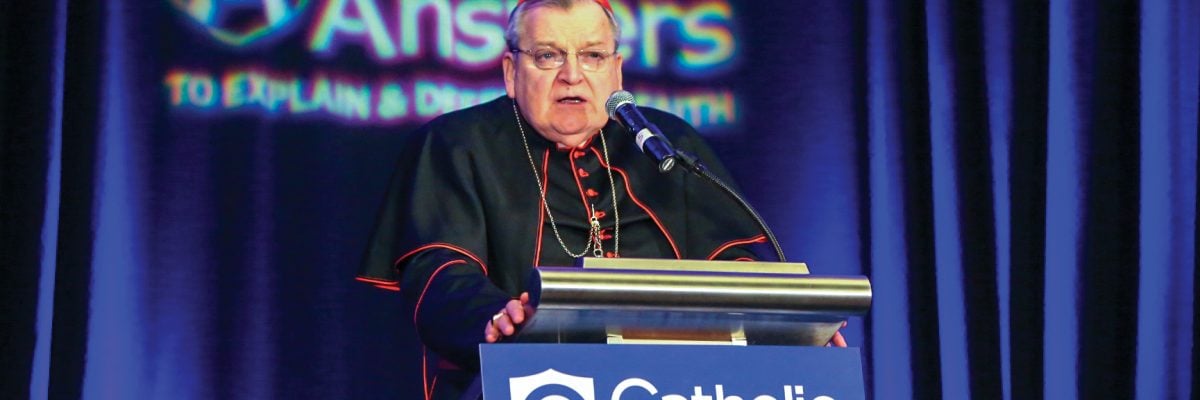
Jimmy Stewart and Margaret Sullavan starred in a delightful romantic comedy called The Shop Around the Corner (1940). I don’t know why the movie’s title included Around the Corner, since the location of the shop was not integral to the story. Maybe director and producer Ernst Lubitsch suspected that calling the movie merely The Shop wouldn’t have worked to draw in moviegoers.
I have to admit that the movie has nothing to do with the topic of this post, which is the four cardinals’ dubia concerning Amoris Laetitia. The movie came to mind—or, I should say, the phrase “around the corner” came to mind—because it was “around the corner” that I found Cardinal Raymond Burke’s residence when I was in Rome a few months ago.
If you walk from St. Peter’s Square toward Castel Sant’Angelo, right at the beginning of Via della Conciliazione there’s a small cross street. Walk down that a few steps, and you come to the building where Burke lives.
It’s just around the corner.
I wasn’t there to talk about the dubia, since the document by the four cardinals was submitted to Pope Francis months later, in September. At the end of our chat Burke and I exchanged literary trinkets. I gave him a copy of my then-latest book, Apologetics the English Way, and he gave me a copy of his Divine Love Made Flesh: The Holy Eucharist as the Sacrament of Charity.
A friend of the cardinal
And that brings me to Thomas McKenna. He is the founder and president of Catholic Action for Faith and Family, the purpose of which is deducible from its name. The small apostolate, established about a decade ago, is headquartered in San Diego. It is the publisher of Burke’s book.
I see McKenna occasionally after Sunday Mass. It’s the earliest Mass, starting at 7:30, and he isn’t always able to make it. He’s younger than I am and perhaps hasn’t reached that point in life where one invariably wakes before the sun has begun its diurnal rounds.
When we do have a chance to see one another, as often as not McKenna is able to share something about what the cardinal has been up to. He probably knows him as well as anyone, since he has been a cooperator with Burke for years and sees him in Rome (or in this country, as the case may be) with regularity.
I was not the least surprised, then, to see that McKenna had an interview with Burke online on the very day that news broke about the dubia. The interview can be found at catholicaction.org, along with the full text of the dubia.
Actually, the dubia (Latin for “questions” or “doubts”) form only part of what was submitted to the pope. The entire package was given the title Seeking Clarity: A Plea to Untie the Knots in Amoris Laetitia. Aside from the five questions, the package contains a foreword, a cover letter to the pope, and explanatory notes.
Great confusion
As Burke explains at the beginning of the interview, “Portions of [Amoris Laetitia] contain ambiguities that cannot be easily untied and are causing great confusion. Sharing the pope’s devotion to Our Lady, Untier of Knots, we are asking him to clarify these ambiguous statements.” The “we” refers to Burke and three retired cardinals who jointly wrote to Francis: Walter Brandmüller, Carlo Caffara, and Joachim Meisner.
In the interview Burke notes that what the cardinals have done isn’t as cheeky as it may seem. “The process of submitting formal questions is a venerable and well-established practice in the Church,” though, admittedly, such questions usually are addressed to lesser officials than popes. (The dubia also were sent to Cardinal Ludwig Müller, prefect of the Congregation for the Doctrine of the Faith.)
The four cardinals haven’t been the only ones asking for clarification. “In the summer of 2016,” says Burke, “forty-five academics, including some prelates, wrote to the Holy Father and to the College of Cardinals, asking the pope to repudiate a list of erroneous propositions that can be drawn from portions of Amoris Laetitia. This received no public response.”
That was followed by a publicly circulated declaration backing the Church’s traditional teaching on marriage. Many bishops, priests, and laymen signed the declaration, but it too has received no public response.
Loyal to Christ above all
All well and fine, notes McKenna, but some Catholics think such actions amount to disloyalty.
Not so, answers Burke. He and the other cardinals “are striving to be loyal to the Holy Father by being loyal to Christ above all.” I suppose you could say it’s the Harry Truman principle: the buck stops here, at the pope’s desk, so it is proper to ask the pope to give definitive explanations of what the contested passages mean, particularly since he signed off on them.
“This is my duty as a cardinal of the Catholic Church,” continues Burke. “I was not created a cardinal in order to receive an honorary position. Rather, Pope Benedict XVI made me a cardinal to assist him and his successors in governing the Church and teaching the Faith. . . . I would not be fulfilling my duty as a cardinal, and therefore as counselor to the pope, if I remained silent on an issue of such serious matter.”
Some orthodox Catholics, including at least one prominent apologist, say there was no reason for the cardinals’ action because the ambiguities in Amoris Laetitia already have been clarified sufficiently—not, admittedly, by the pope himself but by surrogates such as Cardinal Christoph Schönborn.
I disagree. The five questions submitted by the cardinals are framed precisely and narrowly, and I don’t think any of them has been answered cleanly by anyone in authority: not Schönborn, not Müller, and not the pope.
Not that answering them would be a burden on anyone. It doesn’t take half an hour to read Seeking Clarity slowly, and the five questions are phrased to elicit a Yes or No answer. I can see no good reason for no response having been forthcoming, and, so far as I know, no one has offered an explanation of why the pope has ignored the submission.
This doesn’t strike me as the best way for him to have ended the Year of Mercy.



